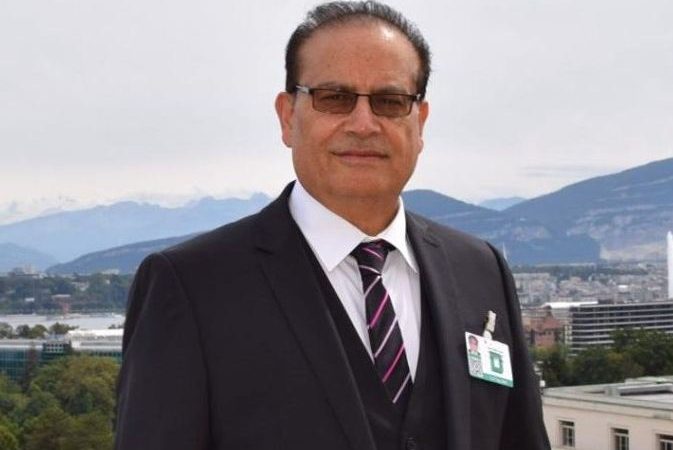Now India Waits for a Befitting Attack from Pakistan

Qamar Bashir
At 8:24 p.m. in Michigan, a dramatic and dangerous shift unfolded in South Asia’s fragile balance. India, in what it called Operation Sindoor, launched 24 long-range missiles targeting eight sites across Pakistan and Pakistan-administered Kashmir. The operation marked a grave escalation, not just militarily but morally and diplomatically.
According to Pakistan’s Inter-Services Public Relations (ISPR), all 24 strikes were carried out using missiles—no aircraft entered Pakistani airspace. Lieutenant General Ahmed Sharif Chaudhry, Director General ISPR, revealed that the attacks struck six civilian areas, killing eight people and injuring 33 others, including women and children. Among the targets were Bilal Mosque in Muzaffarabad, Abbas Mosque in Kotli, and a mosque in Muridke. A shell hit Kotli Loharaan near Sialkot, and a public dispensary in Shakargarh sustained structural damage.
India claims the operation was a response to the April 22 terrorist attack in Pahalgam, where 25 Indian citizens and one Nepali national were killed. It accused Lashkar-e-Taiba and Lashkar-e-Jhangvi of masterminding the assault and alleged that the attackers were trained inside Pakistan. Yet to this day, no proof has been provided to any international institution. No forensic evidence, no communication intercepts, no cross-border intelligence sharing—just unilateral claims, swiftly followed by missile strikes.
From an analytical viewpoint, India’s use of long-range precision-guided missiles, rather than airstrikes, reflects a shift in military doctrine. Likely drawing lessons from the Balakot operation in 2019—when an Indian pilot was captured and an aircraft downed—New Delhi opted for remote strikes. Observational data suggests that the majority of missiles struck their targets, barring two which missed near Kotri and Sialkot. This suggests India has developed substantial accuracy in its missile capabilities through satellite-guided systems. That said, this is an analytical conclusion based on outcomes—not an admission by Pakistani authorities.
Yet even this precision cannot obscure the strategic and moral failure behind India’s actions.
Interestingly—and disturbingly—none of the alleged militant hideouts or religious seminaries (madrasas) were targeted. The missiles struck only mosques—recognized as sacred symbols of worship across the Muslim world. These mosques, by nature of their open public presence and limited capacity, cannot and do not accommodate covert militant training operations. Their location in bustling neighborhoods and association with daily communal prayers makes any such allegation implausible.
This choice of targets raises deep concerns. Regardless of India’s stated objectives, the outcome is an unmistakable desecration of Islamic religious sanctuaries. Even if governments of Muslim-majority countries refrain from publicly condemning the act due to geopolitical considerations, the general public—the masses from Cairo to Jakarta, from Istanbul to Rabat—will view this as an unforgivable attack on the sanctity of Islam. India has, knowingly or unknowingly, invited the wrath of a global Muslim conscience, which may manifest in diplomatic pressure, grassroots protests, and deteriorating people-to-people perceptions worldwide.
India, as the world’s largest democracy and an aspiring global power, had both the opportunity and responsibility to demonstrate restraint, logic, and leadership. Positioned strongly in diplomatic forums, with growing international trade and military stature, India should have pursued dialogue, reason, and a multilateral investigation. But instead, it opted for arrogance. It acted impulsively, trigger-happily—driven not by logic but by revenge.
By doing so, India has not only abandoned its claimed mantle of regional wisdom, but it has also strategically and diplomatically lowered itself to the level of a struggling Pakistan. A state that once claimed the high moral ground now finds itself embroiled in tit-for-tat aggression with a neighbor it routinely derides. In its rush to punish, India has equated itself with Pakistan—an outcome that shatters the very image it seeks to project globally.
Pakistan, though cornered politically and economically, is now left with no choice but to retaliate. But retaliation need not be symmetrical or reckless. In fact, Pakistan now holds a unique strategic initiative.
Among its potential responses is the targeting of India’s water infrastructure—specifically, the series of dams constructed on the Jhelum, Chenab, and Indus rivers in Indian-administered Kashmir. These dams have long been used by India as political leverage, threatening to reduce or block Pakistan’s water supply. Their destruction would not only neutralize India’s coercive potential, but also cripple decades of infrastructure planning. These towering structures, built over many years, could be destroyed in minutes—at a cost India would struggle to recover from for at least another decade. This would be a response that avoids civilian casualties while delivering maximum strategic effect.
Moreover, Pakistan has also long accused India of sponsoring terrorism within its borders—funding separatist militants in Balochistan and aiding TTP factions from Afghan soil. If Pakistan now chooses to strike what it considers Indian-supported militant facilities, it would be simply adopting the very doctrine India used to justify its initial assault.
More broadly, this episode marks the arrival of a new kind of conflict. Gone are the days of cross-border skirmishes and air force dogfights. What we now see is unmanned warfare—missiles, drones, AI-guided weapons, and remote targeting. Both India and Pakistan are equipped with these capabilities. And both are capable of devastating strikes that can paralyze strategic assets within minutes—without a single soldier crossing a border.
International reactions to the crisis are measured but clearly concerned. U.S. Secretary of State Marco Rubio posted on X that he is monitoring the situation closely after being briefed by Indian National Security Adviser Ajit Doval. President Donald Trump, speaking at the White House, described the attack as “a shame,” adding, “I just hope it ends very quickly.” Rubio echoed Trump’s sentiment and pledged to remain in contact with both Indian and Pakistani leadership in hopes of securing a peaceful outcome.
However, events on the ground suggest escalation. Indian airlines including Air India, IndiGo, and SpiceJet have cancelled or diverted flights to Kashmir and cities near the border, including Amritsar, Jammu, Srinagar, Leh, and Rajkot. Two international flights were rerouted to Delhi. These moves, while subtle, are indicative of India bracing for an anticipated Pakistani strike.
India, for now, waits. Not in triumph, but in growing tension.
Pakistan has made it unequivocally clear: a response will come “at a time and place of our choosing.” Whether it targets military facilities, economic infrastructure, or strategic dams, the choice lies with Islamabad—and so does the initiative. The coming days will define whether the region sinks into prolonged hostility or retreats into a renewed balance of deterrence.
India, by acting rashly and without justification, has not only triggered a strategic crisis—it has humbled itself before the world. By targeting mosques, by avoiding evidence, and by discarding diplomacy, it has chosen war over wisdom.
And now, for all its missiles, all its claims, all its declarations—India waits.
Qamar Bashir
Press Secretary to the President (Rtd)
Former Press Minister at Embassy of Pakistan to France
Former MD, SRBC
Macomb, Detroit, Michigan, USA
Related News

Assembly resolution unlawful: MQM
DNA KARACHI: Muttahida Qaumi Movement Pakistan (MQM-P) on Sunday termed a resolution passed by theRead More

Beijing, Islamabad reaffirm all-weather strategic partnership
ISLAMABAD, FEB 22 /DNA/ – On the occasion of the Chinese Spring Festival (Year ofRead More


Comments are Closed